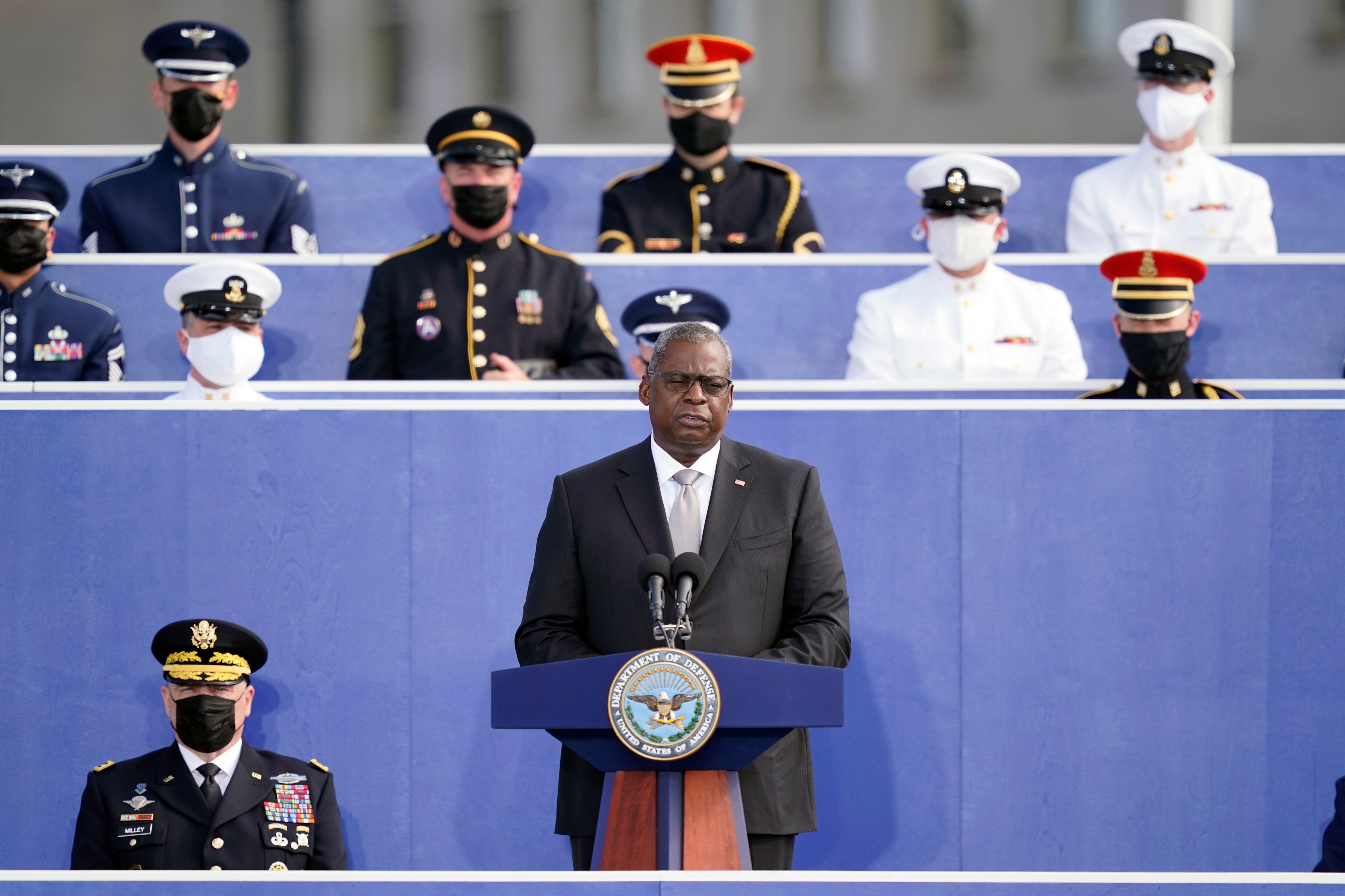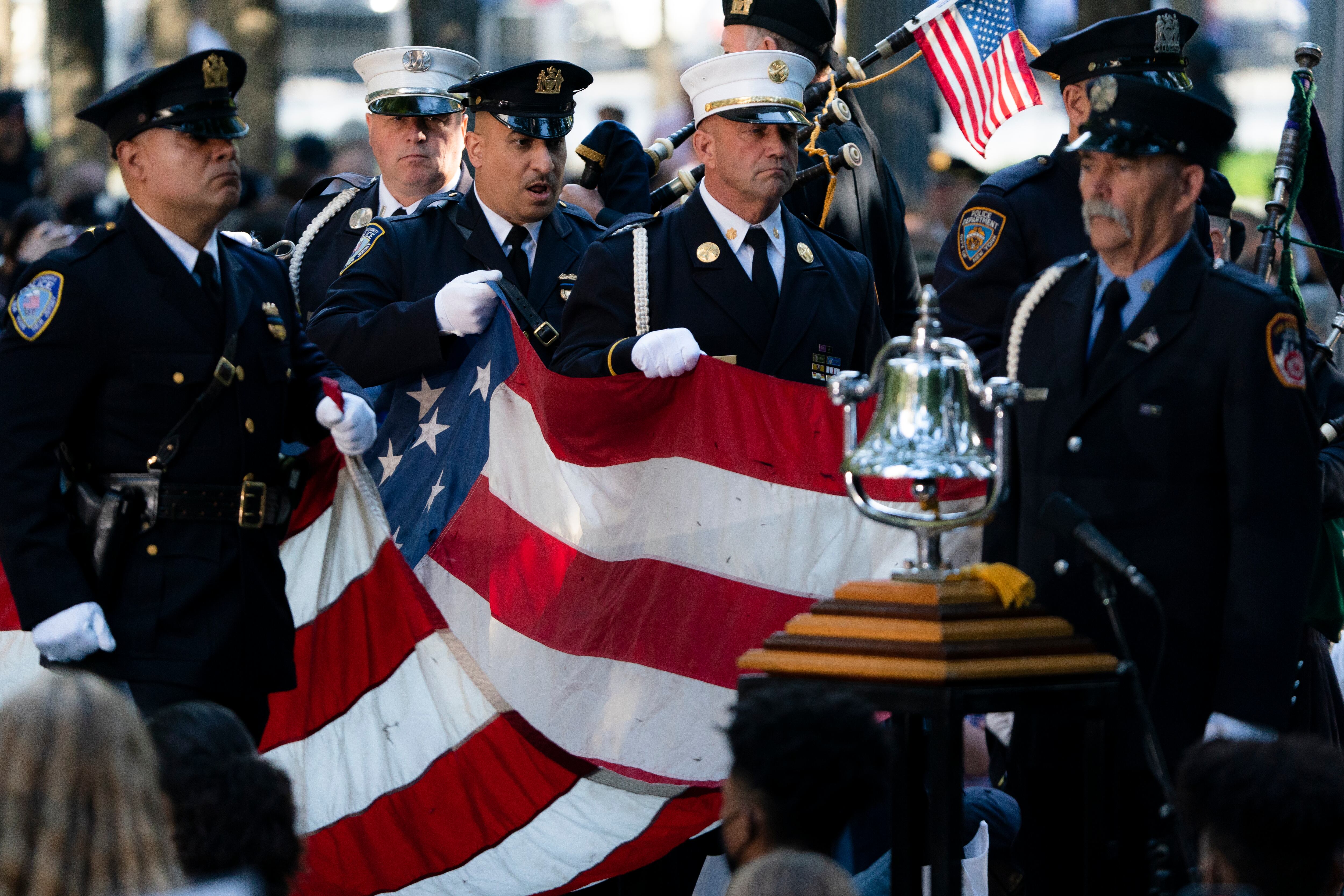Americans solemnly marked the 20th anniversary of 9/11 on Saturday, remembering the deadliest terror attack on U.S. soil just weeks after the fraught end of the Afghanistan war that followed.
With a tolling bell and a moment of silence, the anniversary ceremony at ground zero in New York began exactly two decades after the attack started with the first of four hijacked planes crashing into one of the World Trade Center’s twin towers.
During a ceremony at the Pentagon later on Saturday morning, Defense Secretary Lloyd Austin remembered those killed when American Airlines Flight 77 crashed into the building as the attacks by al-Qaida continued.
“On behalf of the Department of Defense, let me renew our deepest condolences to the families and loved ones of all those lost on 9/11,” said Austin, “including the 184 souls taken from us in the attack on the Pentagon - in the building and on Flight 77. We know that you carry that pain every day.”

Austin, whose department oversaw the chaotic end to a conflict that would see more than 2,400 U.S. troops die, more than 21,000 be wounded and cost taxpayers more than $2 trillion, said that “we remember not just who our fallen teammates were, but the mission that they shared.”
He continued, “We recall their common commitment to defend our republic … and to squarely face new dangers.’’
Austin noted that “almost a quarter of the citizens who we defend today were born after 9/11,” including many of the 13 American service members killed in the recent attack in Afghanistan.
He said that “as the years march on, we must ensure that all our fellow Americans know and understand what happened here on 9/11 … and in Manhattan … and in Shanksville, Pennsylvania.”
The Pentagon chief urged the nation never to forget.
“It is our responsibility to remember,” he said. “And it is our duty to defend our democracy.”
New York remembers
“It felt like an evil specter had descended on our world, but it was also a time when many people acted above and beyond the ordinary,” said Mike Low, whose daughter, Sara Low, was a flight attendant on American Airlines Flight 11, which crashed into the North Tower.
Her family has “known unbearable sorrow and disbelief” in the years since, the father told a crowd that included President Joe Biden and former presidents Barack Obama and Bill Clinton.
But “as we carry these 20 years forward, I find sustenance in a continuing appreciation for all of those who rose to be more than ordinary people,” Low said.
Biden was also scheduled to pay respects at the two other sites where the 9/11 conspirators crashed the jets: the Pentagon and a field near Shanksville, Pennsylvania. Together, the attacks killed nearly 3,000 people.

The anniversary unfolded under the pall of a pandemic and in the shadow of the U.S. withdrawal from Afghanistan, now ruled by the same militants who gave safe haven to the 9/11 plotters.
“It’s hard because you hoped that this would just be a different time and a different world. But sometimes history starts to repeat itself and not in the best of ways,” said Thea Trinidad, who lost her father in the attacks and read victims’ names at the ceremony at ground zero in New York.
In a video released Friday night, Biden mourned the ongoing losses of 9/11.
“Children have grown up without parents, and parents have suffered without children,” said Biden, a childhood friend of the father of a Sept. 11 victim, Davis Grier Sezna Jr.
But the president also spotlighted what he called the “central lesson” of Sept. 11: “that at our most vulnerable ... unity is our greatest strength.”
Former President George W. Bush, the nation’s leader on 9/11, is due at the Pennsylvania memorial. The only other post-9/11 U.S. president, Donald Trump, plans to be in New York.
A nation reflects
Other observances — from a wreath-laying in Portland, Maine, to a fire engine parade in Guam — are planned across a country now full of 9/11 plaques, statues and commemorative gardens.
In Shanksville, Pa., the victims and heroes of Flight 93 are being commemorated at a ceremony at the site where the plane crashed in a field.

President Joe Biden was making an appearance, and Vice President Kamala Harris, former President George W. Bush and Pennsylvania Gov. Tom Wolf were also speaking.
Wolf said the passengers and crew of Flight 93, whose actions are believed to have led the hijackers to abandon their mission of targeting the U.S. Capitol, offered a lasting lesson of courage and hope.
“This story and this place remind us each day what it means to be an American,” said Wolf, a Democrat. “In times of strife, we Americans, we come together. We comfort each other. We protect each other and we stand up for each other. This memorial is a powerful reminder of what we have lost. But it’s also a powerful reminder of the strength of the American spirit.”
Larry Catuzzi, father of Flight 93 passenger Lauren Catuzzi Grandcolas, said in an interview that he talks to her every day.
“I say something that kind of reminds me of her, and I’ll talk to her. Or something good happens to me and i thank her for her being with me,” said Catuzzi, whose 38-year-old daughter was pregnant when she perished.
The family started a foundation in her name that has distributed college scholarships to more than 100 girls, funded three neonatal units and built a park in Houston memorializing the victims of Flight 93.
A society forever changed
In the aftermath of the attacks, security was redefined, with changes to airport checkpoints, police practices and the government’s surveillance powers. For years afterward, virtually any sizeable explosion, crash or act of violence seemed to raise a dire question: “Is it terrorism?” Some ideological violence and plots did follow, though federal officials and the public have lately become increasingly concerned with threats from domestic extremists after years of focusing on international terror groups in the wake of 9/11.
New York faced questions early on about whether it could ever recover from the blow to its financial hub and restore a feeling of safety among the crowds and skyscrapers. New Yorkers ultimately rebuilt a more populous and prosperous city but had to reckon with the tactics of an empowered post-9/11 police department and a widened gap between haves and have-nots.
A “war on terror” led to invasions of Iraq and Afghanistan, where the longest U.S. war ended last month with a hasty, massive airlift punctuated by a suicide bombing that killed 169 Afghans and 13 American service members and was attributed to a branch of the Islamic State extremist group. The U.S. is now concerned that al-Qaida, the terror network behind 9/11, may regroup in Afghanistan, a country once again in the hands of Taliban militants.
Sept. 11 propelled a surge of shared grief and common purpose, but it soon gave way.
Muslim Americans endured suspicion, surveillance and hate crimes. The quest to understand the catastrophic toll of the terror attacks prompted changes in building design and emergency communications, but it also spurred conspiracy theories that seeded a culture of skepticism. Schisms and resentments grew over immigration, the balance between tolerance and vigilance, the meaning of patriotism, the proper way to honor the dead, and the scope of a promise to “never forget.”
Trinidad was 10 when she overheard her dad, Michael, saying goodbye to her mother by phone from the burning trade center. She remembers the pain but also the fellowship of the days that followed, when all of New York “felt like it was family.”
“Now, when I feel like the world is so divided, I just wish that we can go back to that,” said Trinidad, of Orlando, Florida. “I feel like it would have been such a different world if we had just been able to hang on to that feeling.”
